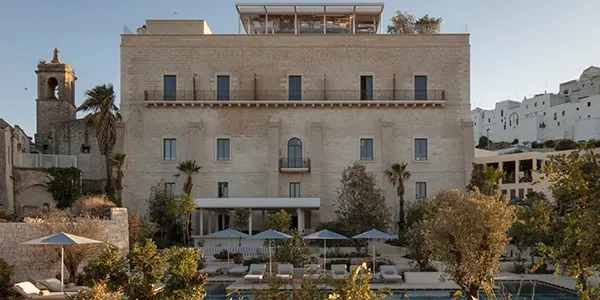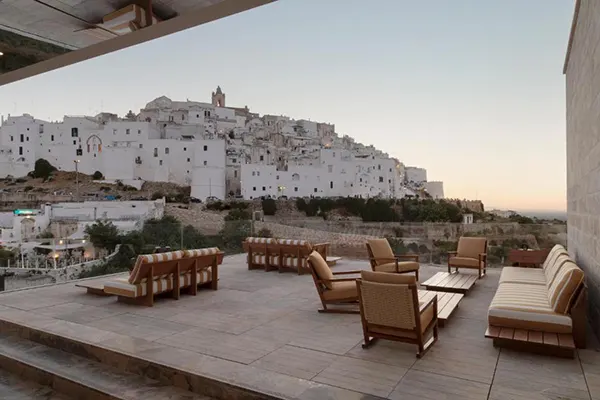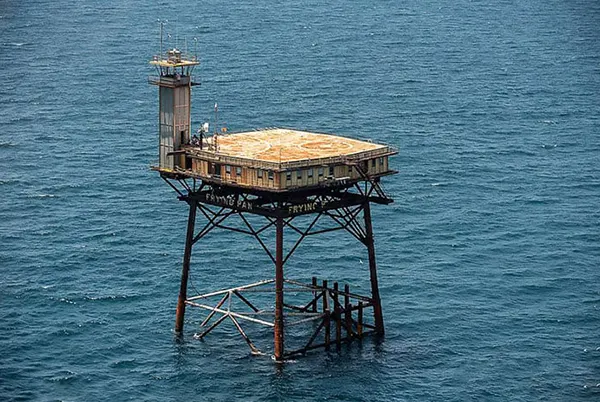
Vista Ostuni (Italy) — A Renaissance Within the Walls of a Former Monastery
Vista Ostuni is a five-star hotel located in the heart of Ostuni, the “White City” of Puglia, Italy. The property stands as a remarkable transformation of a Dominican monastery dating back to the 14th century. Over centuries, this historical complex evolved into an orphanage and later a tobacco factory before being meticulously restored into a luxury retreat. Today, it represents a perfect balance between heritage and contemporary design, making it a unique destination for travellers seeking both authenticity and sophistication.
The Historical Setting of Vista Ostuni
The building that houses Vista Ostuni has a rich and layered past. Originally constructed by Dominican monks, the monastery served as a spiritual and cultural centre for the city. In later centuries, it became an orphanage, providing shelter and education to local children. The transformation into a tobacco factory in the industrial era marked yet another stage in its evolution, linking the monastery to the economic fabric of Puglia.
The latest restoration carefully preserved many of the original architectural elements. The stone arches, vaulted ceilings, and authentic ceramic details from the region highlight its historical identity. Each intervention was planned to maintain the authentic spirit of the monastery while adapting it to the needs of modern hospitality.
This heritage background provides guests with more than accommodation; it offers an opportunity to experience the layers of Italian history that continue to live within the walls of Vista Ostuni. The contrast of its centuries-old structure with present-day luxury creates an atmosphere that feels both timeless and current.
Architectural Restoration and Design Philosophy
The restoration of Vista Ostuni was guided by a philosophy of respect for the past combined with innovation for the future. Architects and designers worked with local artisans to integrate traditional Puglian craftsmanship into the interiors. Hand-made ceramics, natural stone, and bespoke furniture designed exclusively for the hotel create a setting that is deeply rooted in place.
The design language blends Mediterranean minimalism with influences from Japanese, tropical, and industrial aesthetics. Soft light filters through arches, tropical plants add lush contrasts to whitewashed walls, and steel elements reference the building’s industrial past. This harmony of styles ensures that each space feels distinctive while still coherent with the hotel’s identity.
Guests encounter not only elegance but also authenticity in every corner. The result is a retreat that celebrates cultural diversity through design while maintaining a deep respect for local heritage.
Accommodation and Guest Experience
Vista Ostuni offers a selection of rooms and suites, each designed to combine comfort with individuality. Many rooms feature restored stone walls and original beams, while modern amenities ensure that guests enjoy the highest standards of luxury. The use of natural textures, neutral tones, and artisanal details creates an atmosphere of calm and refinement.
Beyond the rooms, communal spaces such as the library, lounge areas, and gardens extend the sense of understated luxury. The hotel also incorporates wellness spaces, including a spa that draws on natural therapies and Mediterranean traditions. These facilities highlight a holistic approach to hospitality, focusing on both relaxation and cultural immersion.
Dining at Vista Ostuni is another highlight. The hotel’s restaurant celebrates Puglian cuisine with a contemporary interpretation. Local produce, olive oils, wines, and cheeses form the basis of menus that respect tradition while exploring modern culinary creativity. Guests are invited to enjoy authentic flavours that mirror the region’s agricultural richness.
Wellness, Cuisine, and Cultural Integration
The wellness offering at Vista Ostuni combines spa treatments with a focus on mindfulness. Natural oils, herbal infusions, and techniques rooted in Mediterranean practices are integrated into therapies. This enhances not only physical well-being but also the emotional connection with the region’s traditions.
The culinary concept of the hotel strongly reflects its local environment. By collaborating with farmers, cheesemakers, and vineyards, Vista Ostuni creates a sustainable cycle that supports the community while delivering freshness to the guests’ table. This dedication to authenticity reinforces the cultural identity of the hotel.
Furthermore, the hotel regularly hosts events, art exhibitions, and workshops that celebrate local artisans and traditions. Through these initiatives, guests gain an opportunity to engage with Puglian culture in a meaningful and interactive way, making their stay an experience beyond conventional hospitality.

Vista Ostuni as a Symbol of Contemporary Heritage
Vista Ostuni represents more than a luxury hotel; it symbolises the rebirth of a historic building into a living monument of culture. By combining preservation with innovation, it demonstrates how historical architecture can find new relevance in the 21st century. This transformation ensures that the monastery continues to contribute to the life of Ostuni.
The hotel plays a vital role in strengthening Ostuni’s identity as a cultural destination. It attracts not only tourists but also professionals, artists, and scholars interested in heritage and design. In this way, Vista Ostuni reinforces the city’s reputation as a meeting point of tradition and creativity.
As of 2025, Vista Ostuni has become a benchmark for heritage-based hospitality in Italy. Its model inspires other restoration projects that aim to give historic buildings a new purpose while respecting their origins. The balance of sustainability, design, and authenticity ensures its lasting place among Europe’s most remarkable hotels.
Future Perspectives and Cultural Influence
The influence of Vista Ostuni extends beyond tourism. By showcasing how a building can be transformed without losing its essence, it sets an example for sustainable urban regeneration in Italy and abroad. This approach encourages communities to reconsider the value of neglected heritage structures.
Looking forward, the hotel aims to strengthen its environmental commitment through renewable energy use and further collaboration with local artisans. These initiatives ensure that its growth remains in harmony with the city and the wider region of Puglia.
Ultimately, Vista Ostuni is more than a place to stay; it is a cultural project. By embodying both history and modernity, it inspires visitors to reflect on the importance of preserving identity while adapting to contemporary needs.




